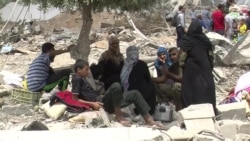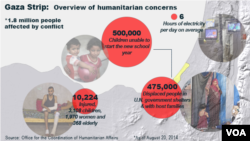As an open-ended cease-fire took effect beginning Tuesday night, ending seven weeks of hostilities, Palestinians celebrated in the streets of Gaza while Israelis showed more reserve.
Hamas spokesman Sami Abu Zuhri hailed the truce, negotiated by Egypt, as a victory for the Palestinian cause.
"We are here today to declare that we have won over this destructive Israeli power," Abu Zuhri said. "We won, first and foremost thanks to God almighty, and, second, thanks to the resilience of our people."
The 50-day conflict was the longest ever between Israel and Hamas. The Gaza fighting killed at least 2,137 Palestinians, many of them civilians, as well as 69 Israelis. All but five of them were soldiers.
Skepticism remains
Israeli government spokesman Mark Regev blamed the high death toll on Hamas, the group that controls Gaza.
"We hope that this time the cease-fire will stick,” Regev said, referring to several previous cease-fire agreements that collapsed within days. “And I think now that, as the dust will begin to clear, many people will be asking, why is it that today Hamas accepted the very same Egyptian framework that it rejected a month ago?"
Some Israelis welcomed the end of hostilities, but those in communities hit hard by Hamas rockets remained wary.
"I really want to trust the cease-fire, but unfortunately we've been burned before several times," said Dafna Siboni Sasson, who lives in Kibbutz Nir Am in the country’s south. "Several times we returned here and thought [the conflict] was over and all of a sudden it happened again and fire was renewed. So we wait. Time will tell."
Bigger negotiating points
Israel wants Gaza to be demilitarized. Any cease-fire should prevent Hamas from rebuilding its network of rockets and infiltration tunnels, said Yoram Schweitzer, an analyst at Tel Aviv’s Institute for National Security Studies.
Hamas "should be kept … from using this reconstruction, rehabilitation, for replenishing its rocket arsenal and for rebuilding those tunnels again," said Schweitzer, an Israeli.
Hamas wants an end to Israel's blockade of Gaza. This needs to be addressed, said Mukhaimar Abu Saada, a political science professor at Gaza’s al-Azhar University.
"If this siege is not going to be lifted completely, we are definitely going to witness another round between Hamas and Israel in the future," said the professor, a Palestinian.
Analysts noted that similar demands had not been met during previous cease-fires. As a result, they said any durable peace would depend primarily on a political agreement.






